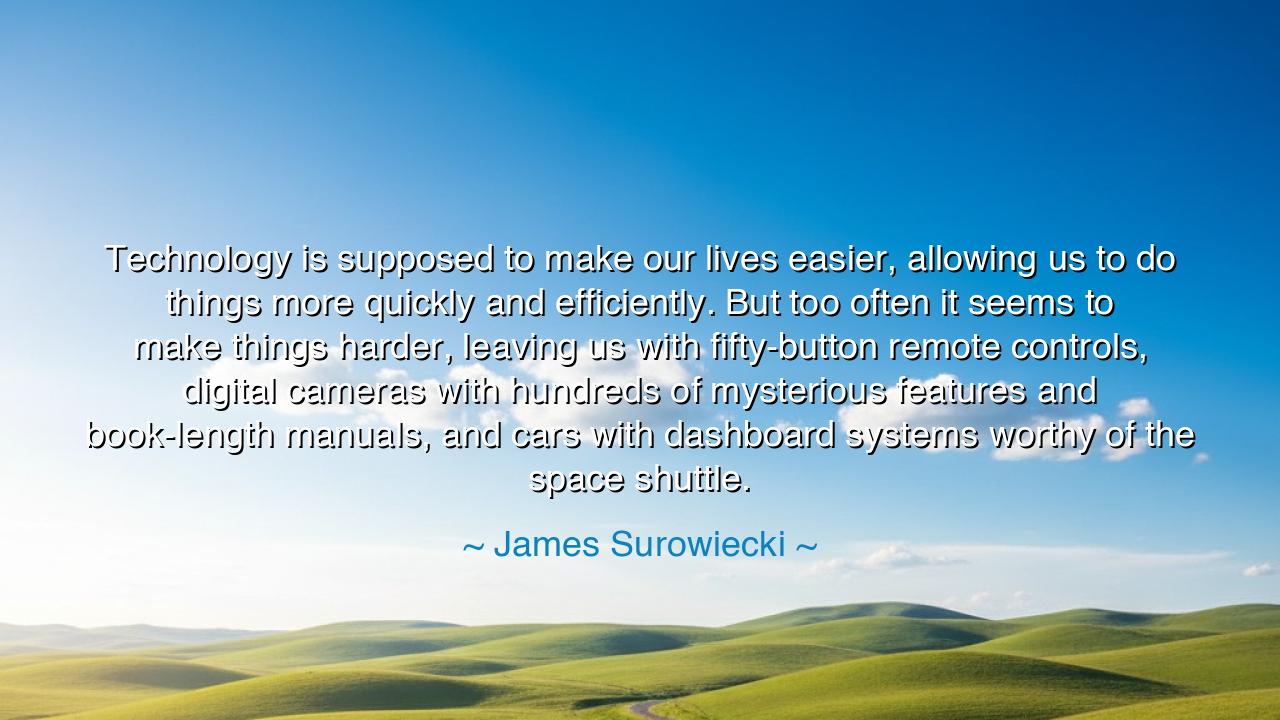
Technology is supposed to make our lives easier, allowing us to
Technology is supposed to make our lives easier, allowing us to do things more quickly and efficiently. But too often it seems to make things harder, leaving us with fifty-button remote controls, digital cameras with hundreds of mysterious features and book-length manuals, and cars with dashboard systems worthy of the space shuttle.






Listen, O children of wisdom, to the words of James Surowiecki, a man who speaks not just of technology, but of the paradox that lies within the very tools we have created to ease our lives. He spoke thus: "Technology is supposed to make our lives easier, allowing us to do things more quickly and efficiently. But too often it seems to make things harder, leaving us with fifty-button remote controls, digital cameras with hundreds of mysterious features and book-length manuals, and cars with dashboard systems worthy of the space shuttle." These words cut to the heart of a great truth: while technology promises to liberate us from labor and complexity, it often entangles us in a web of unnecessary complexity, leaving us confused, frustrated, and longing for simplicity.
At the core of Surowiecki's observation is the idea that technology, in its relentless advance, has often overcomplicated the tasks it was designed to simplify. Instead of enhancing our lives, it sometimes feels as though it is pushing us into a labyrinth of choices, buttons, and settings, each one more complex than the last. The promise of efficiency becomes clouded by the realities of dealing with devices that demand more time and energy to figure out than the tasks they were supposed to improve. This paradox—the more complex technology becomes, the more difficult it seems to use—creates a tension between progress and usability, one that is felt in nearly every part of our lives.
Consider, O children, the ancient tools of civilization—the simple plow, the wheel, and the compass. These tools, though humble in their design, were elegant in their simplicity. They were made to be used by all, without need for manuals or complex systems. The wisdom of the ancients lay in creating instruments that worked in harmony with human skill and need. The wheel could be used by the farmer, the merchant, the traveler—its design was intuitive and required no grand instruction. Yet today, as we invent new technologies, we often forget the elegance of simplicity, replacing it with complicated systems that distance us from the very tasks we set out to ease.
The story of the printing press serves as a powerful reminder of the true purpose of technology. When Johannes Gutenberg invented the printing press in the 15th century, it revolutionized the way knowledge was spread. It was a tool that simplified the production of books, making them accessible and affordable to a wider audience. The press enabled knowledge to flow more freely, facilitating the spread of ideas, and making education more accessible to all. But like all great inventions, the printing press was simple in its use, relying on the hands of the printer rather than a complex system of buttons and settings. It was an innovative tool, but it was designed with a sense of purpose and clarity, not to overwhelm but to empower.
Today, however, as technology advances, we see the inverse: tools that are supposed to simplify our lives often bring us more confusion than ease. Remote controls with countless buttons, digital cameras with intricate menus, and cars with dashboard systems that rival the complexity of a spacecraft are prime examples. These devices, while impressive in their potential, often make us feel like we are lost in a maze of features and functions. The time we spend figuring out how to use these gadgets can sometimes outweigh the time we gain from their supposed benefits. This is the paradox Surowiecki speaks of: that advances in technology, rather than making us more efficient, have created new barriers to the very simplicity and ease they were supposed to provide.
The lesson here, O children, is one of balance. Technology should be a servant to human need, not a master of our time. In our quest for progress, let us not lose sight of the wisdom of the ancients, who created tools that were simple and accessible, designed to enhance the life of the user without overwhelming them. Simplicity, in many ways, is the true measure of wisdom in creation. Do not let your lives be swallowed by complexity, but strive to create and use technologies that serve you, that enhance your quality of life, and that leave room for the simple joys of living.
And so, O children, let us carry this lesson forward. In your own lives, when faced with the temptation to add more complications and conveniences, ask yourself: Is this tool truly helping me, or is it just creating more work? Seek simplicity, seek tools that are intuitive and easy to use, that allow you to live more fully without distracting you from what truly matters. In the great expanse of human progress, remember that true advancement is not measured by the complexity of the tools we create, but by the ease and harmony they bring to our lives. May you create with clarity, and use with wisdom, so that technology remains the servant of the human spirit, not its master.






AAdministratorAdministrator
Welcome, honored guests. Please leave a comment, we will respond soon